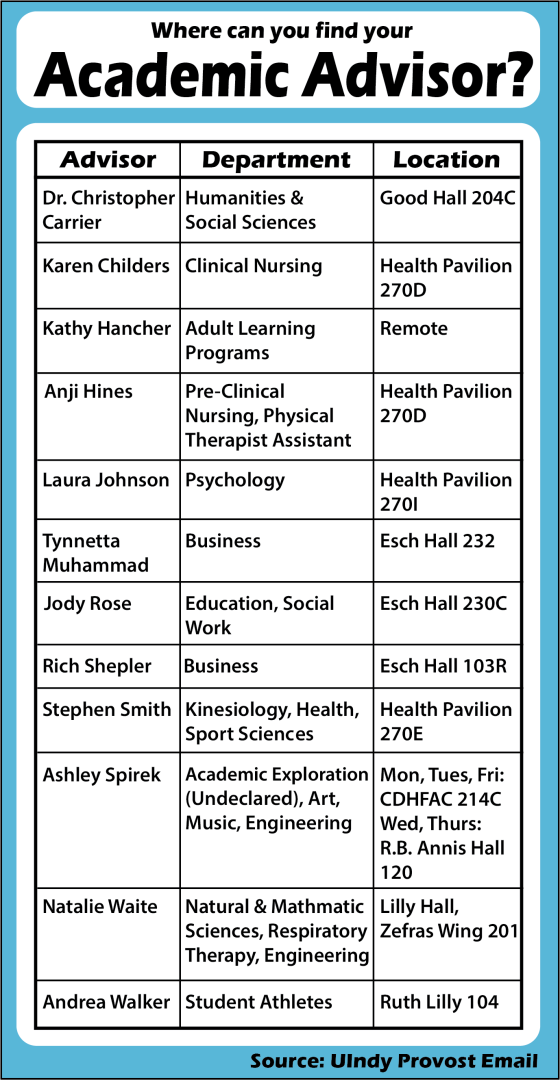The Center for Advising and Student Achievement at the University of Indianapolis has formally disbanded. Among other changes, what was referred to as CASA will now be referred to as advising. Associate Provost at UIndy Rebecca Gilliland said CASA’s purpose was to make advising more centralized and to function as one entity that served over all academic advising. With the change, advisors will now be located in the specific building in the major they advise over.

Gilliland said advising has evolved since she began working at the university 17 years ago. She said this change has decentralized advising and given individual majors their own advisor.
“The advising function is going to be more within units, meaning there will be a specific advisor over an area, and then a faculty advisor will still be assigned to all students within their major,” Gilliland said.
Staff advisor for the Shaheen College of Arts and Sciences Christopher Carrier said that students will now be assigned a faculty and staff advisor. He said faculty advisors will focus more on scheduling, while staff advisors will focus on bigger picture things.
“One of the biggest structural changes is that every student, from day one, has two advisors, a staff advisor and a faculty advisor,” Carrier said.
Gilliland said one purpose of the changes within advising is to create a better connection between the students and advisors. An example of how this is being implemented is that now advisors are located in the areas in which the students will be. For instance, for communication majors, their advisor will now be located in Esch Hall instead of in Schwitzer Student Center where they used to be located. This gives the students more direct access to their advisor, Gilliland said. The hope is that this change will drive more relationship building between students and their advisor.
Gilliland said that the UIndy website gives a good overview of what advising is now and which advisors are in which major areas. Students can expect communication about these changes to come directly through email by the student’s advisor. Students are also welcome to reach out to their advisor at any time through the contact information on the website.
Gilliland added that she is hopeful things within advising will continue to evolve and improve as these transitional changes are being made. She said there are no other expected changes in the advising area in the future. Carrier said it is important to remember that advising, as a unit, is still figuring things out as they go, but their main priority is helping students succeed.
“It’s helpful to remember that we don’t have it all figured out yet, we’re still figuring out how some things work and fit together… but that’s also just a reminder about how the world is. We encounter uncertainty and unknowing all the time and have to figure stuff out all the time,” Carrier said. “It doesn’t mean we don’t know what we’re doing. It also doesn’t mean that we don’t care. We care about all of our students and helping them succeed.”
Gilliland said she thinks this transition will be a positive implementation and that she hopes it will allow for students to have one-on-one opportunities to speak with their advisors. A lot of students come to UIndy for personal attention and relationship building, according to Gilliland, so this change will provide more opportunities for that.
“This adds another element to that, where these advisors are much more concentrated over an area and you have your more specific advisor over the department,” Gilliland said. “I think that it just gives you two people who are a little more acclimated and in-tune to specific areas that will be able to help you long term. Overall it’s going to be a positive thing for relationship building.”All students regardless of their year will be assigned to an advisor based on their major. Students can contact them through email. UIndy’s meet with an advisor webpage has helpful information on how each advisor would like to be contacted.






